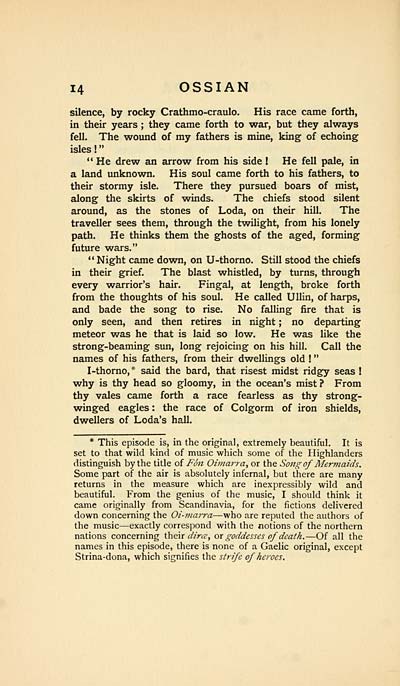Ossian Collection > Poems of Ossian
(42)
Download files
Complete book:
Individual page:
Thumbnail gallery: Grid view | List view

14 OSSIAN
silence, by rocky Crathmo-craulo. His race came forth,
in their years ; they came forth to war, but they always
fell. The wound of my fathers is mine, king of echoing
isles ! "
"He drew an arrow from his side 1 He fell pale, in
a land unknown. His soul came forth to his fathers, to
their stormy isle. There they pursued boars of mist,
along the skirts of winds. The chiefs stood silent
around, as the stones of Loda, on their hill. The
traveller sees them, through the twilight, from his lonely
path. He thinks them the ghosts of the aged, forming
future wars."
" Night came down, on U-thorno. Still stood the chiefs
in their grief. The blast whistled, by turns, through
every warrior's hair. Fingal, at length, broke forth
from the thoughts of his soul. He called Ullin, of harps,
and bade the song to rise. No falling fire that is
only seen, and then retires in night ; no departing
meteor was he that is laid so low. He was like the
strong-beaming sun, long rejoicing on his hill. Call the
names of his fathers, from their dwellings old ! "
I-thorno,* said the bard, that risest midst ridgy seas !
why is thy head so gloomy, in the ocean's mist ? From
thy vales came forth a race fearless as thy strong-
winged eagles : the race of Colgorm of iron shields,
dwellers of Loda's hall.
* This episode is, in the original, extremely beautiful. It is
set to that wild kind of music which some of the Highlanders
distinguish by the title oi Fan Oiinarra, or the Song of Mer^jiaids.
Some part of the air is absolutely infernal, but there are many
returns in the measure which are inexpressibly wild and
beautiful. From the genius of the music, I should think it
came originally from Scandinavia, for the fictions delivered
down concerning the Oi-iuai-ra — who are reputed the authors of
the music — exactly correspond with the notions of the northern
nations concerning iheit dinv, or goddesses of death. — Of all the
names in this episode, there is none of a Gaelic original, except
Strina-dona, which signifies the sh-jfe of heroes.
silence, by rocky Crathmo-craulo. His race came forth,
in their years ; they came forth to war, but they always
fell. The wound of my fathers is mine, king of echoing
isles ! "
"He drew an arrow from his side 1 He fell pale, in
a land unknown. His soul came forth to his fathers, to
their stormy isle. There they pursued boars of mist,
along the skirts of winds. The chiefs stood silent
around, as the stones of Loda, on their hill. The
traveller sees them, through the twilight, from his lonely
path. He thinks them the ghosts of the aged, forming
future wars."
" Night came down, on U-thorno. Still stood the chiefs
in their grief. The blast whistled, by turns, through
every warrior's hair. Fingal, at length, broke forth
from the thoughts of his soul. He called Ullin, of harps,
and bade the song to rise. No falling fire that is
only seen, and then retires in night ; no departing
meteor was he that is laid so low. He was like the
strong-beaming sun, long rejoicing on his hill. Call the
names of his fathers, from their dwellings old ! "
I-thorno,* said the bard, that risest midst ridgy seas !
why is thy head so gloomy, in the ocean's mist ? From
thy vales came forth a race fearless as thy strong-
winged eagles : the race of Colgorm of iron shields,
dwellers of Loda's hall.
* This episode is, in the original, extremely beautiful. It is
set to that wild kind of music which some of the Highlanders
distinguish by the title oi Fan Oiinarra, or the Song of Mer^jiaids.
Some part of the air is absolutely infernal, but there are many
returns in the measure which are inexpressibly wild and
beautiful. From the genius of the music, I should think it
came originally from Scandinavia, for the fictions delivered
down concerning the Oi-iuai-ra — who are reputed the authors of
the music — exactly correspond with the notions of the northern
nations concerning iheit dinv, or goddesses of death. — Of all the
names in this episode, there is none of a Gaelic original, except
Strina-dona, which signifies the sh-jfe of heroes.
Set display mode to: Large image | Transcription
Images and transcriptions on this page, including medium image downloads, may be used under the Creative Commons Attribution 4.0 International Licence unless otherwise stated. ![]()
| Early Gaelic Book Collections > Ossian Collection > Poems of Ossian > (42) |
|---|
| Permanent URL | https://digital.nls.uk/82631015 |
|---|
| Description | Selected books from the Ossian Collection of 327 volumes, originally assembled by J. Norman Methven of Perth. Different editions and translations of James MacPherson's epic poem 'Ossian', some with a map of the 'Kingdom of Connor'. Also secondary material relating to Ossianic poetry and the Ossian controversy. |
|---|
| Description | Selected items from five 'Special and Named Printed Collections'. Includes books in Gaelic and other Celtic languages, works about the Gaels, their languages, literature, culture and history. |
|---|

